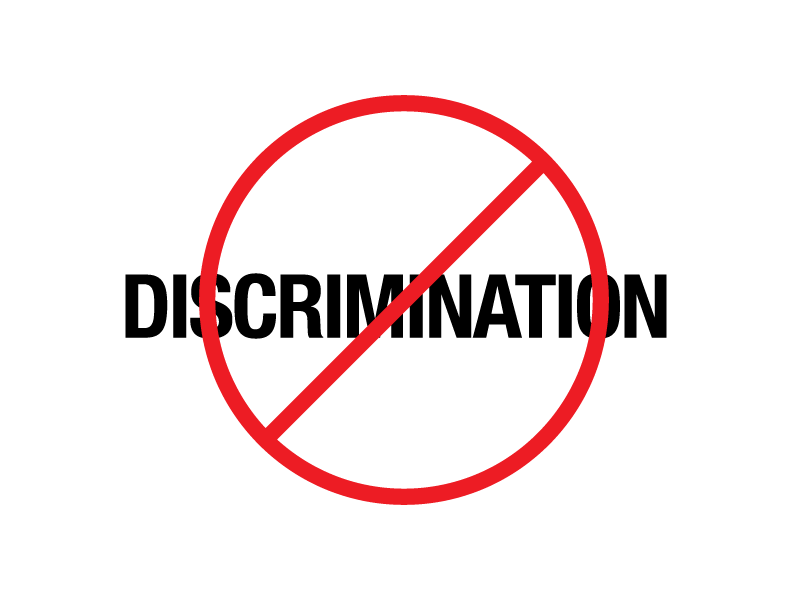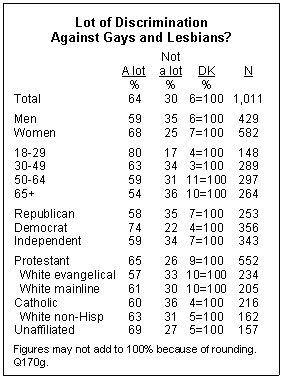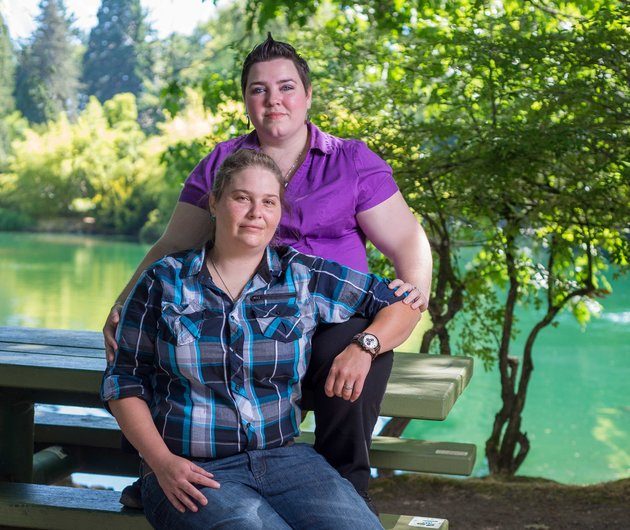Is discrimination against lesbians ever okay?
Social media is a land unto itself. In the 140 character universe of Twitter, where politics reigns supreme, there’s always something to discuss. Politics maven that I am, I love Twitter for its immediacy and for the plethora of feminists I have met from different countries, many of whom I correspond with on a near-daily basis. This discourse has been invaluable to me over the past year while I have been severely disabled by a catastrophic health crisis.
I often see political discussions on Twitter where I think, “What made THAT person choose THIS fight?” Yet I found myself in that very place a few days ago, arguing with a young lesbian acquaintance over something seemingly superficial.
Except it wasn’t. Not to me. And when the discourse was over–unresolved and anger-inducing for all the women involved–I had come to some realizations about how much we internalize lesbophobia and how much we come to accept it as, well, acceptable.
As a feminist, I take issue with false equivalencies. That’s how I got into the argument.
Women are always told that some discrimination against us is less than others. And yet it all comes from the same source: misogyny.
Several dozen tweets in I was thinking perhaps I should have just stayed silent. Except micro-aggression and macro-aggression come from the same source: oppression. Which was my point.
At issue: physical threats to lesbians versus being denied a wedding cake. If it sounds like the proverbial apples and oranges, it is. Which is exactly why I spoke out. Violence against lesbians is pandemic. It gets little attention in any media, even our own, because lesbians are on the lowest rung of the societal ladder.
No one would argue that violence against a lesbian was equivalent to being denied a wedding cake. So why argue that at all? Why set up the false equivalency? Why, when conversely, a lesbian being beaten up for being a lesbian at one end of the world doesn’t negate the discrimination involved in a lesbian on the other end of the world being denied a wedding cake.
Both things happen solely because these women are lesbians and women who reject men are threatening.
140 characters is not the best venue for this kind of discourse, despite the fact that we are both deft tweeters. But 50+ tweets later and the interjection of another lesbian left us all cranky and no closer to agreement.
Yet as always when I engage with other feminists on Twitter, I came away with more knowledge. In this instance, though, the knowledge was unnerving as hell.

I came away from the argument even more sure of my position. As we got deeper into it, I realized the other women believed that the rights of a straight person–a baker, in this instance–to discriminate against lesbians because of that baker’s “beliefs” that we are going to hell for being lesbians superceded the fact that we deserve equal rights, be they to a wedding cake or to something more vital, like our jobs or medical care.
One of the women even said Kim Davis, the Kentucky marriage license clerk who refused to authorize marriage licenses to lesbian and gay couples was treated horribly. Both agreed someone’s religious beliefs should take precedence over our rights.
No.

The fact is, there’s no such thing as a little bit of discrimination. The road to separate but equal is always separate and never equal. Marginalization is oppression. Sexual orientation is as immutable as race and being able to pass–which only some of us can do and none of us wants to do–means the distinction is blurry at best.
Which is where I came in. If a lesbian is under threat for being a non-passing butch, then that lesbian is under threat for her sexual orientation. We have to recognize the breadth of that, how it impacts every lesbian.
And so while I understand being threatened with physical violence supercedes whether or not another lesbian gets her wedding cake, it’s all part of the same package: the package marked discrimination, marginalization and yes, oppression. It’s not a big step from denying a lesbian service at your business to denying her a job to punching her in the face. It’s all connected.
My argument was singular: No amount of discrimination is acceptable. Period. When Rachel and Laurel Bowman-Cryer were denied a wedding cake in Oregon in 2013, it violated Oregon anti-discrimination laws. The bakery denying them the cake knew they were breaking the law and they didn’t care.

One of the women arguing with me said it was a “petty use of the law” to sue the bakery and that the lawsuit was tantamount to “forced labor.” Neither thing is true. Laws are made to protect people–people we like, people we don’t like. The First Amendment protects Donald Trump and it also protects me. We might not like the fact that people we despise have protection, but we need those same protections. Fifty years ago the kind of writing I do here could have gotten me arrested in almost every state.
There are very few protections against discrimination for lesbians in America. Yes, we have marriage equality now, but that law has brought its own kind of discriminatory blowback, which includes a dramatic up-tick in firings of lesbians who have gotten married.
In the majority of states it’s still perfectly legal to fire a woman for being a lesbian. No other reason–just that. Landlords can discriminate against us. So can hotels. Restaurants can refuse to serve us. So can shops. Lesbians can be denied credit–whether single or married. Lesbians can be excluded from juries. Lesbians can be denied entrance to movies, theaters, clubs and other venues.
Thus using the few anti-discrimination laws there are? Not petty. Necessary. Many lesbians, including myself, have fought over the years for the little bits and pieces of civil rights that we have. We can’t afford to relinquish any of it. We need all of it.
In June 2015, when the U.S. Supreme Court legalized marriage equality, many lesbians thought the ruling would open the door to more equality, but for many lesbians the ruling hurt as well as healed. Margie Winters was fired from her longtime teaching job in Philadelphia after it was revealed that she had married her partner, Andrea Vettori, and several parents complained.
(1).jpg)
Another lesbian teacher, Barbara Webb, taught chemistry and was a volleyball coach at Marian High School in Bloomfield Hills, Mich., for ten years. Webb was fired right before the 2015 school year began in mid-August when the all-girl’s Catholic school was informed Webb and her wife of six years, Kristen Lasecki, were expecting their first child.
Olivia Reichert and Christina Gambaro were both fired in September 2015 from Cor Jesu, an all girls’ Catholic school in St. Louis, Missouri. Reichert and Gambaro had applied for a mortgage together and someone sent the school a copy of the application. Like Webb, the couple were legally married.
Because there are no protections for lesbians in employment, none of the women had legal recourse. As Gambaro told the St. Louis Dispatch, “The law is not on our side.”
Nor was it, tragically, on the side of an Iowa lesbian whose name was erased from her stillborn baby’s death certificate, invalidating her motherhood.
Here’s where that wedding cake comes into play again: Tennessee recently passed the Religious Viewpoints Anti-Discrimination Act, which ostensibly made it legal for religious students to bully lesbian and gay kids in schools by repeatedly stating that homosexuality is a sin and against God.
It also allows businesses to discriminate against lesbians and gay men. Other states have also put forward laws discriminating specifically against lesbians and gay men.
Many lesbians have stayed in the closet for years, erased from their own lives because it was too dangerous to come out. But once some of these women decide to marry, there is a public record of their lesbianism. They don’t need to put an announcement in the newspaper–people can discover it on their own. And discriminate accordingly.
In Nov. 2015 a lesbian couple in Utah had their one-year-old foster child taken away from them when they filed for adoption. April Hoagland and Beckie Peirce were told by Judge Scott Johansen that “through his research he had found out that kids in homosexual homes don’t do as well as they do in heterosexual homes.”
In the course of the discussion with the lesbians on Twitter I argued that all discrimination has to be taken seriously and that we had learned from the Jim Crow era that separate never means equal.
Both women disagreed with me, but law professors all over America as well as LGBT legal organizations attest to the breadth of discrimination experienced by lesbians throughout the country. Sam Marcosson, a law professor at the University of Louisville told CNN Money, “Is discrimination as frequent as was racial discrimination in the Jim Crow era? I don’t think so. But it’s not difficult to find victims of LGBT discrimination everywhere today.”
A survey of nearly 700 LGBT people by the Center for American Progress found that ten percent of the lesbians had been fired within the past five years. If ten percent of any other group were being fired just for who they are, there would be international headlines.
One of the women in this Twitter argument asked sarcastically if a wedding cake–”a middle class symbol”–was really the hill I wanted to die on. I explained yet again that it wasn’t about a wedding cake, it was about discrimination. THAT was the hill I was always going to be willing to die on. That was the hill I have risked my life for over several decades of in the streets activism which has included arrests for civil disobedience.
And if it were just one cake, just one time, I don’t know–would I care? I can’t say. But the pattern and plethora of discrimination against lesbians is compounded by each instance and each thing. The first time someone calls you a dyke or a lesbo or worse, it shocks the system. A hundred times later, it feels less painful, more internalized, more expected. The first time a boss tells you to look less dykey at work, your stomach flips over and you worry that you’ll be fired and so you say, okay and the next day you look less like yourself and more like someone else. The first time you get sat in the back of the restaurant, near the kitchen, with your partner, you shrug it off. The tenth time you think going out to eat was supposed to be special, a splurge, but maybe it’s just not worth it.
The line between micro-aggression and macro-aggression is very fine.
.jpg)
On Feb. 8 Katherine Knott, 25, was sentenced to five to ten months in jail for an anti-gay attack in Sept. 2014. Knott and two male friends verbally and physically assaulted two gay men in Philadelphia resulting in one of the men having his jaw wired shut for weeks and both sustaining other injuries, including concussions and a broken eye socket.
Knott, the daughter of a local police chief, had years of anti-lesbian and anti-gay slurs on her Facebook and Twitter pages. At the sentencing, Common Pleas Court Judge Roxanne Covington, who is African American, said the victims “could have been any of us. While there were homophobic slurs that initiated this event, it could have been any type of hateful slur.”
.jpg)
Covington told the court that while the Pennsylvania state legislature “has not properly recognized” attacks on lesbians and gay men as a hate crime, “these actions are still hateful” and what happened to the victims “is a violation of human rights and this court recognizes it as such.”
In March 2014, Britney Cosby and Crystal Jackson, both 24, were murdered in an honor killing, allegedly by Cosby’s father James in a Houston suburb. Cosby, 46, bludgeoned his daughter Britney Cosby to death and shot her lover, Crystal Jackson, in the head at point blank range before dumping the bodies in Port Bolivar, Texas, according to police. Cosby has been in jail since March 2014.
Britney Cosby’s mother, Loranda McDonald, told police that James Cosby was “disgusted” by his daughter’s lesbianism and felt it brought shame on the family and that “something needed to be done.”
.jpg)
Religious belief is the leading reason for honor killings of lesbians which occur throughout the world.
There are so many incremental incidents that lead from a wedding cake refused to a job lost to a baby taken away to a concussion, broken eye socket and a jaw wired shut to a shot to the head and a bludgeoning. Religious beliefs are often cited as rationales for these actions, from the wedding cake to the honor killing. As lesbians, we are at risk in every aspect of our lives because we have so few protections. We are marginalized and discriminated against at literally every turn whether we are poor or working class, middle class or even wealthy like some lesbian celebrities. Being marginalized is exhausting. Who wants to take a baker to court? How many lesbian couples did nothing before Rachel and Laurel Bowman-Cryer said enough? How many lesbian couples were fired from their jobs before Margie Winters went to the local news stations about her firing? How many April Hoaglands and Beckie Peirces were there before they refused to allow their child to be taken away without telling someone it was wrong. How many times did Kathryn Knott shove someone to the ground or punch then in the face before it was caught on camera and the victims came forward?
Not everyone can protest discrimination. And that’s part of the oppression–not being able to speak out because of fear. But as radical lesbian activist Audre Lorde said, “Your silence will not protect you. When we are silent, we are still afraid. So it is better to speak.”
And if we don’t speak, we don’t need to wait for someone else to erase us. We erase ourselves.
